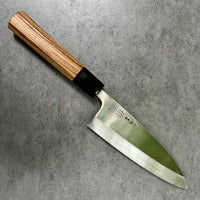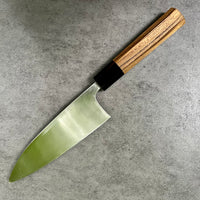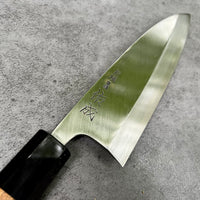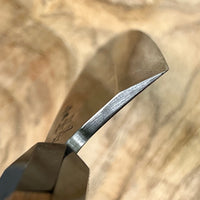Sukenari (佑成/すけなり) is a small artisan knife maker based in Toyoma city of Japan. Established in 1933 by Fijikichi Hanaki, Sukenari became famous in Japan for its Honyaki forged knives, one of the hardest forging techniques. Now in the hands of 3rd generation Hanaki - Mr. Nobuo Hanaki, Sukenari is continuing pushing the envelop of chef knives while committed to the finest tradition of Japanese knife making. Today Sukenari is known for its work with various super steel.
The blade heel and spine are finely hand polished for a comfortable and secure grip; the blade is finely sharpened and shiny, just waiting to be used by its new owner.
The Japanese Deba, which is also called the Hon-deba (Literally, “true deba"), is traditionally used to clean and fillet whole fish, but it is also commonly used for breaking down and dressing poultry and other meat with small bones. The significant weight of the Deba is desirable because, with adequate care, the sturdy heel section of the knife can be used to cut or chop through the bones found in small and medium-sized fish and poultry.
Use & Care
- Do not attempt to cut, hit or chop frozen products or bones. The blade can chip or break with improper use.
- Hand wash with warm water and towel dry. Never put the knife in a dishwasher, nor soak it in water. Ever!
- Use a sharpening stone to maintain the sharpness of the blade.
- Do not use on hard melons or items that may torque the blade.
- Description
Sukenari (佑成/すけなり) is a small artisan knife maker based in Toyoma city of Japan. Established in 1933 by Fijikichi Hanaki, Sukenari became famous in Japan for its Honyaki forged knives, one of the hardest forging techniques. Now in the hands of 3rd generation Hanaki - Mr. Nobuo Hanaki, Sukenari is continuing pushing the envelop of chef knives while committed to the finest tradition of Japanese knife making. Today Sukenari is known for its work with various super steel.
The blade heel and spine are finely hand polished for a comfortable and secure grip; the blade is finely sharpened and shiny, just waiting to be used by its new owner.
The Japanese Deba, which is also called the Hon-deba (Literally, “true deba"), is traditionally used to clean and fillet whole fish, but it is also commonly used for breaking down and dressing poultry and other meat with small bones. The significant weight of the Deba is desirable because, with adequate care, the sturdy heel section of the knife can be used to cut or chop through the bones found in small and medium-sized fish and poultry.
Use & Care
- Do not attempt to cut, hit or chop frozen products or bones. The blade can chip or break with improper use.
- Hand wash with warm water and towel dry. Never put the knife in a dishwasher, nor soak it in water. Ever!
- Use a sharpening stone to maintain the sharpness of the blade.
- Do not use on hard melons or items that may torque the blade.









